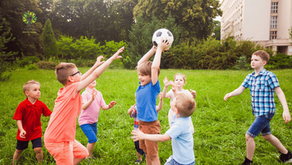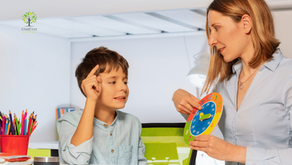10 Autism-Friendly Activities for Growth & Fun
- ChildFirst Behavior Therapy

- Apr 29, 2024
- 5 min read

Autism Spectrum Disorder (ASD) affects individuals differently, but one thing remains consistent: the need for tailored activities that promote growth and enjoyment. Engaging in activities that are autism-friendly not only fosters skill development but also enhances social interaction and self-expression. Let’s explore ten autism-friendly activities designed to facilitate growth and fun for individuals on the autism spectrum.
Arts and Crafts
Art activities provide a valuable creative outlet for individuals with autism to express themselves freely. By offering a variety of art supplies such as crayons, markers, paints, and clay, individuals are encouraged to explore their creativity through different mediums. Experimentation with various techniques allows them to discover their preferences and strengths in artistic expression. Engaging in arts and crafts not only nurtures creativity but also promotes the development of essential skills such as communication, fine motor coordination, and self-esteem. Through the process of creating art, individuals with autism can communicate their thoughts, feelings, and experiences non-verbally, fostering self-expression and emotional well-being. Additionally, manipulating art materials enhances fine motor skills, hand-eye coordination, and receptive integration. As individuals see their creations come to life, they gain a sense of accomplishment and pride, boosting their self-esteem and confidence.
Nature Walks
For individuals with autism, spending time outdoors can be profoundly therapeutic. Embarking on leisurely walks in nature parks or gardens offers a myriad of experiences. Observing the vibrant colors of flowers, the rustling of leaves in the wind, and the gentle movements of wildlife can captivate the senses and instill a sense of wonder. Engaging in activities like bird watching or collecting leaves encourages exploration and discovery, fostering a deeper connection with the natural world. The tranquil ambiance of nature promotes relaxation, providing a reprieve from the demands of everyday life. Moreover, the experience provided by outdoor environments can help individuals with autism regulate their processing, promoting a sense of calm and well-being. Additionally, nature walks offer opportunities for physical activity, promoting overall health and well-being.
Music Therapy
Music holds a profound influence on individuals with autism, serving as a powerful medium for communication and emotional expression. Music therapy offers tailored sessions that cater to the unique preferences and needs of each individual. Through music therapy, individuals with autism can explore various musical activities, including playing instruments, singing, or simply listening to calming melodies. Engaging in musical experiences fosters social interaction by providing opportunities for group participation and collaboration. Moreover, music therapy supports emotional regulation by offering a safe outlet for expressing feelings and reducing anxiety. The rhythmic and melodic elements of music can have a soothing effect, promoting relaxation and stress reduction. Additionally, participating in music therapy activities stimulates cognitive development by enhancing auditory processing, attention, and memory skills. Whether it's drumming to a beat, singing along to a favorite song, or improvising melodies, music therapy provides a holistic approach to addressing the unique needs of individuals with autism.
Board Games
Board games offer valuable opportunities for individuals with autism to develop essential skills such as social interaction, turn-taking, and strategic thinking. When selecting board games, it's important to choose options that are age-appropriate and align with the individual's interests. By focusing on games that capture their attention and enthusiasm, you can create an engaging and enjoyable experience. Cooperative board games, where players work together towards a common goal, are particularly beneficial for individuals with autism. These games promote teamwork, communication, and problem-solving skills in a supportive and inclusive environment. Through collaboration and shared decision-making, individuals learn to navigate social dynamics and develop a sense of camaraderie with their peers. Furthermore, engaging in board games enhances cognitive flexibility by requiring players to adapt their strategies based on changing circumstances and opponents' actions.

Cooking and Baking
Cooking and baking activities present invaluable opportunities for individuals with autism to acquire practical life skills while enjoying themselves in the kitchen. Engaging individuals in simple cooking tasks, such as measuring ingredients, mixing batter, or decorating cookies, allows them to participate in the culinary process actively. Following step-by-step instructions and utilizing visual aids supports comprehension and fosters independence in the kitchen. As individuals embark on culinary adventures, they not only learn essential cooking techniques but also explore elements such as textures, smells, and tastes. Engaging in cooking promotes exploration, encouraging individuals to experiment with different ingredients and flavors. Moreover, manipulating kitchen tools and utensils enhances fine motor coordination and agility.
Lego Building
Lego building is a versatile activity that appeals to individuals of all ages and abilities. Provide a variety of Lego sets or loose bricks for open-ended construction. Encourage creativity and problem-solving as individuals build structures, vehicles, or imaginary worlds. Lego building fosters spatial awareness, attention to detail, and fine motor skills.
Yoga and Mindfulness
Yoga and mindfulness activities offer therapeutic benefits for individuals with autism, promoting relaxation and self-awareness. Practice simple yoga poses and breathing exercises tailored to individual abilities. Incorporate tools such as weighted blankets or fidget toys to enhance comfort and focus. Yoga and mindfulness promote emotional regulation, body awareness, and stress management.
Role-Playing Games
Role-playing games provide opportunities for imaginative play and social interaction in a structured environment. Choose role-playing scenarios that reflect individual interests, such as pretending to be superheroes, doctors, or characters from favorite movies. Encourage individuals to take on different roles and engage in cooperative storytelling. Role-playing games promote creativity, communication skills, and empathy.
Animal-Assisted Activities
Interacting with animals can have a profoundly positive impact on individuals with autism, fostering emotional connection and social engagement. Visit petting zoos, animal shelters, or therapy animal programs where individuals can interact with gentle animals such as dogs, cats, or horses. Engage in activities like grooming, feeding, or playing with animals under supervision. Animal-assisted activities promote empathy, and emotional well-being.
Conclusion
Engaging in autism-friendly activities is crucial for promoting growth, development, and enjoyment for individuals on the autism spectrum. By providing tailored experiences that cater to individual preferences and needs, we can create meaningful opportunities for learning, socialization, and self-expression. Whether it's arts and crafts, nature walks, or music therapy, the key is to foster a supportive environment that celebrates diversity and encourages individual strengths. With suitable activities, individuals with autism can thrive and experience the joy of learning and exploring the world around them. If you're in Arlington Heights, IL, consider checking out the center-based ABA Therapy Providers like ChildFirst Behavior Therapy for center-based ABA Therapy Services.
FAQs
How can arts and crafts benefit individuals with autism?

Art activities provide a creative outlet for individuals with autism to express themselves freely. By experimenting with various art supplies and techniques, individuals can discover their preferences and strengths in artistic expression. Engaging in arts and crafts nurtures creativity, promotes essential skills such as communication and fine motor coordination, and fosters self-esteem and emotional well-being through non-verbal expression.
Why are nature walks recommended for individuals with autism?
Nature walks offer therapeutic benefits for individuals with autism by providing exposure to different environments and opportunities for exploration. Observing the natural environment can captivate the senses, promote relaxation, and enhance regulation. Additionally, spending time outdoors encourages physical activity and fosters a deeper connection with the natural world.
How does music therapy help individuals with autism?
Music therapy offers tailored sessions that cater to the unique preferences and needs of individuals with autism. Engaging in musical activities such as playing instruments, singing, or listening to calming melodies fosters social interaction, emotional regulation, and cognitive development. Music has a soothing effect, promoting relaxation and stress reduction while also enhancing auditory processing, attention, and memory skills.
What are the benefits of playing board games for individuals with autism?
Board games provide valuable opportunities for individuals with autism to develop essential skills such as social interaction, turn-taking, and strategic thinking. Cooperative board games, in particular, promote teamwork, communication, and problem-solving skills in a supportive environment. Engaging in board games also enhances cognitive flexibility and fosters a sense of camaraderie with peers.







This is a fantastic list of activities. I love the variety you’ve included, from the soothing power of nature walks to the structured creativity of Lego building. The emphasis on how each activity supports specific developmental needs—like fine motor skills in cooking or spatial awareness in building—is incredibly helpful for parents and caregivers.
What’s striking is how many of these "autism-friendly" activities are actually deeply regulating for adults as well. Many neurodivergent adults find solace in these exact same pursuits—getting lost in a creative project, the repetitive calm of swimming, or the structured logic of gaming—often without realizing why these activities feel so essential to their well-being.
For adults who find themselves gravitating towards these specific types of regulation and…